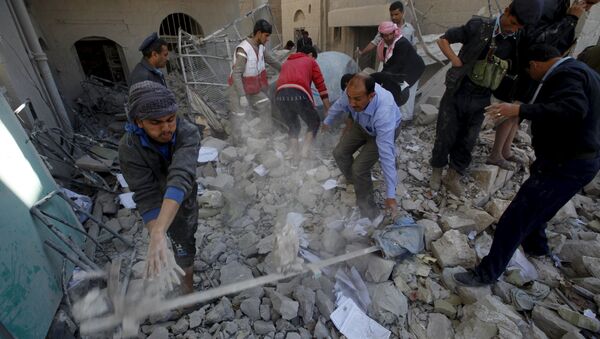The UN announced plans to amend last week’s "blacklist" of children’s rights-offending regimes, removing the Saudi-led coalition currently attacking Yemen, amidst intense lobbying by the United States and strident objection from Riyadh.
The UN’s Annual Report on Children and Armed Conflict (CAAC) included the Saudi-led coalition’s military campaign against the Houthi political opposition faction in Yemen on its list of systematic violators, citing the coalition’s indiscriminate airstrikes that have been documented as consistently killing children.
On Monday, UN Secretary General Ban Kim Moon "accepted a proposal by Saudi Arabia that the United Nations and the Saudi-led coalition review jointly the cases and numbers cited in the text" before officially including the kingdom on its list of children’s rights violators in the near future.
The UN Secretary General attempted to sidestep the controversy surrounding the move, pointing out that the removal of Saudi Arabia from the list is temporary, and noting the importance that "the report reflects the highest standards of accuracy possible." Saudi Arabia’s UN envoy quickly contradicted Ban Ki-Moon’s talking point, saying the removal of the Saudi-led military coalition from the blacklist was "final."
Saudi Arabia also argued that, notwithstanding the egregious human rights violations, inclusion of Saudi forces on the list “contradicts” previous UN resolutions endorsing the government the Saudi-led war intends to prop up in Yemen.
The move shocked the international human rights community, after noting the inclusion of Saudi Arabia on the list, citing the kingdom’s responsibility for 60% of child deaths in Yemen since 2015.
Human Rights Watch called the move by the United Nations to strip Saudi Arabia from the list, "deeply disturbing," likening the deletion to the kingdom’s successful lobbying effort with the UN General Assembly to avoid war crime accusations for atrocities committed by Riyadh in Yemen.
The move also likely factors in the effect of a US domestic law that prohibits selling weapons to countries that violate human rights or are guilty of war crimes. Observers note that America would lose one of its primary weapons purchasers if Saudi Arabia were included on the list or, at the least, the Obama administration would face international condemnation for aiding and abetting widespread casualties.
Since the Saudi-led coalition, supported by the US and UK, attacked the Houthis in March 2015, over 6,500 Yemeni civilians have been killed. Of those who have died, the UN report attributes 510 child deaths and 667 child injuries to some 50 separate attacks on schools and hospitals by the Saudi-led coalition.
Saudi envoy to the UN Abdullah al-Mouallimi calls the UN report "wildly exaggerated," and claims that the number of child and civilian deaths attributed to Saudi forces in Yemen is false. "If there are any casualties from the coalition side, they would be far, far lower," he promised. The kingdom spokesman also touted a highly-sophisticated US weapon Riyadh has been using in their war against Yemen, which he suggested was "the most up-to-date equipment in precision targeting."




